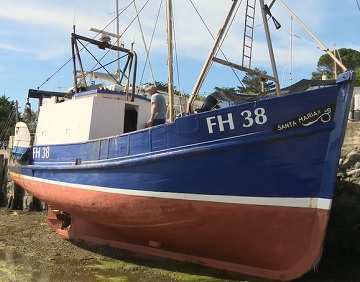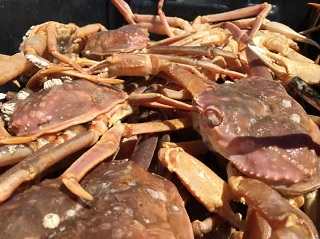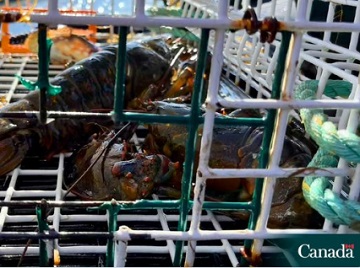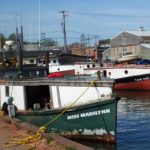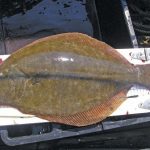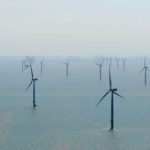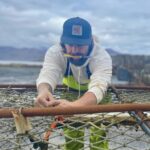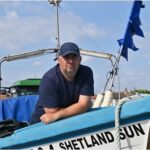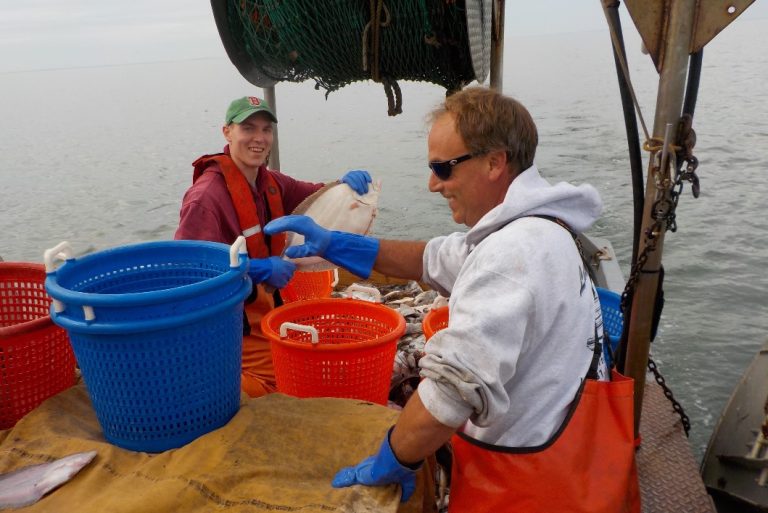Author Archives: borehead - Moderator
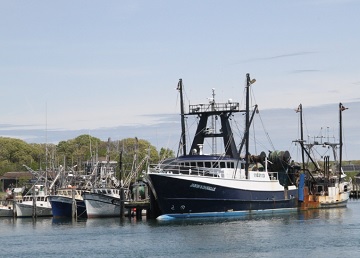
Commercial Fishermen Wary Of Proposed Sanctuary For Hudson Canyon
The Biden Administration has renewed a longstanding proposal,,, Even though most of the Hudson Canyon is about as far from the South Fork as Queens and Brooklyn, commercial and recreational fishermen from East End ports frequent the waters above it, and news of the sanctuary nomination was met with some reflexive concern from commercial fishermen, in particular, who worry that if the designation is made it could lead to them eventually being blocked from fishing in an area critical to their annual harvests. “About 25 percent of what we catch is from there, squid, scup, fluke, a lot of stuff comes out of that area,” said Hank Lackner, one of the owners of Montauk’s largest commercial fishing trawlers, the 94-foot Jason & Danielle. “And for the local fleet, the mid-sized trawlers, that’s the end of their rope — that’s as far as they can go. They don’t have another option.” photos, >click to read< 17:58
Commercial fishing vessel aground on Ponte Vedra Beach
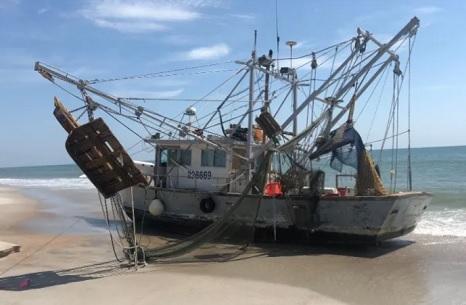 It’s not a great day for this commercial fishing vessel…This story will be updated! >click to read< 15:06
It’s not a great day for this commercial fishing vessel…This story will be updated! >click to read< 15:06

‘Deadliest Catch’ Bank Robber – From Catching Crabs Pots to Being Caught
Famed author Hunter S. Thompson once wrote, “The TV business is uglier than most things. It is normally perceived as some kind of cruel and shallow money trench through the heart of the journalism industry, a long plastic hallway where thieves and pimps run free and good men die like dogs, for no good reason.” In the case of Joshua Tel Warner, he straddled the worlds of television and thievery. It hasn’t escaped our notice that a man whose job in life was catching crabs pots, couldn’t avoid being caught himself. >click to read< 13:27
Athearn Marine Agency Boat of the Week: 43’X15′ Novi Lobster Boat with Area 2 Permit
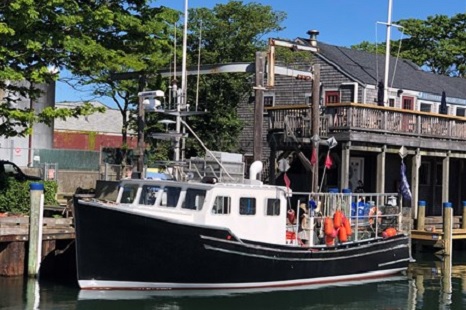 To review specifications, information, and 10 photos’, >click here<, To see all the boats in this series >click here< 11:30
To review specifications, information, and 10 photos’, >click here<, To see all the boats in this series >click here< 11:30
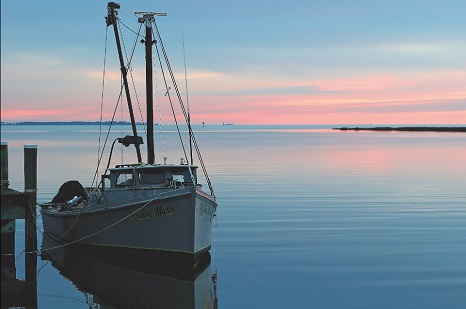
A Place Called Guinea – In Gloucester County, a centuries-old culture with its own dialect endures.
This place is where watermen weathered rugged conditions all day every day, fishing the rivers, dredging the oysters, and hauling in crab pots to harvest the seemingly endless bounty of the Chesapeake Bay. Smelling like fish, dismissive of their swollen hands and knuckles, these same men would later gather in a general store, you could find one on almost every corner, and swap stories over whose catch was the biggest. “Whoever was louder was the winner,” says fireman Nick Bonniville, whose father, grandfather, and a generation of great grandfathers all worked the Guinea waters. >click to read< 08:15
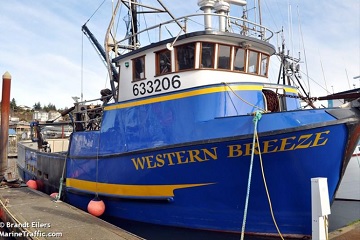
F/V Western Breeze has been raised
A Newport fishing vessel featured on a spinoff of the documentary series “Deadliest Catch” is back on top of the water, and presumably bound for dry dock, after sinking at the Port Dock 5 fuel dock on Thursday. The Western Breeze is owned by Gary Ripka, who also operates the similarly painted, smaller F/V Redeemer, and in 2016 was featured on the Discovery Channel’s “Deadliest Catch: Dungeon Cove,” a Newport-based spinoff of the Emmy-winning series. Ripka purchased the Western Breeze, previously named Miss Melanie, as a bank repossession and rebuilt it, according to a testimonial on the Oregon Coast Bank website. Photos, >click to read< 07:27
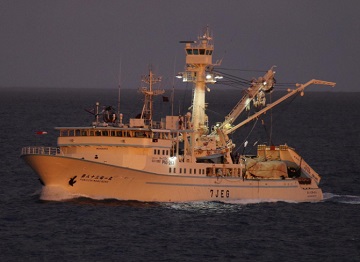
U.S. Coast Guard, Japanese Coast Guard and U.S. Navy medevacs fisherman off Guam
Members of the U.S. Coast Guard, Japan Coast Guard, and U.S. Navy rescued a mariner aboard a fishing vessel south of Guam. On Tuesday, June 7, 2022, U.S. Coast Guard Forces Micronesia/Sector Guam’s Joint Rescue Sub-Center (JRSC) received a report of a 55-year old male experiencing severe abdominal pain aboard F/V Fukuichimaru No. 83, nearly 725-nautical miles south of Guam. Photos, >click to read< 22:05
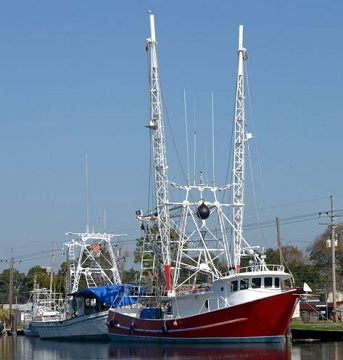
A Double Whammy: Louisiana shrimpers face high diesel prices, cheap imports
Record high diesel prices and competition from cheap, imported shrimp are hitting Louisiana shrimpers in the wallet and driving some of them out of business. Acy Cooper Jr. is a shrimper in Plaquemines Parish and the president of the Louisiana Shrimp Association. “Here in Louisiana, you can make a little bit of a living if you catch a few shrimp. We’re in between seasons now and once the shrimp starts slowing up, you can’t continue working at that price. A lot of folks are going to try to keep working, but once they see they can’t overcome it,” Cooper said of high fuel prices, “they’re going to shut down.”>click to read the article< 18:54
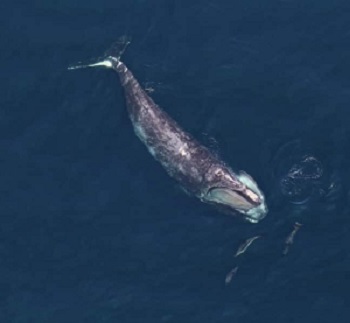
North Atlantic Right Whale: Oceana Wins First Step In USMCA Complaint
The Secretariat for the Commission for Environmental Cooperation, part of the United States-Mexico-Canada Agreement (USMCA), has agreed to move forward with the first step in a two-step process to investigate the USA’s failure to uphold its environmental laws to protect North Atlantic right whales, according to an Oceana announcement this week. The decision was in response to Oceana’s filing the first-ever “Submission on Enforcement Matters” against the US government under the USMCA last October. The ocean advocacy organization claimed the government has violated the USMCA by failing to enforce environmental laws to protect critically endangered North Atlantic right whales, of which only around 330 remain. >click to read< 14:53
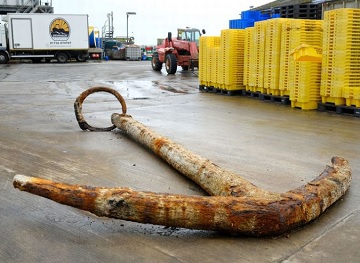
Cornwall ice cream man and fisherman devastated by fuel price crisis
Record-high fuel prices are deeply affecting businesses across Cornwall. Reaching almost £2 in multiple stations, various business owners have shared the impact it has taken on their businesses. Fisherman Peter, from St Mawes, said he can no longer afford to go to sea as the price of fuel has risen from 30 per cent to 50 per cent of his daily expenditure, which has reached as high as £270 a day for diesel. He said that it is not possible for his catch to cover such a rise, forcing him to give up his livelihood and security. “I have no income, full stop,” he said. “Fear is if you’re at sea for 14 hours a day, and everyone who knows boats knows they’re expensive to run. If you have a breakdown and have to replace parts on a winch then suddenly it’s a step back before you know it. >click to read< 12:01
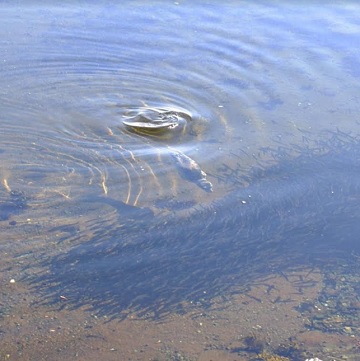
Make-or-break moment for province’s Liberal MPs; seal vote goes before Parliament on Wednesday
Seaward Enterprises Association of Newfoundland and Labrador (SEA-NL) is calling on the province’s six Liberal Members of Parliament to vote for a bill before Parliament Wednesday (July 15th) that would force Fisheries and Oceans to implement seal management plans. “This is one of those make-or-break moments for our Members of Parliament when they must decide whether they represent Newfoundland and Labrador in Ottawa or the other way around,” says Ryan Cleary, Executive Director of SEA-NL, and a former NDP MP. “Seals eat fish just as surely as MPs need votes.” Bill C-251 calls on the federal minister of Fisheries and Oceans to develop management plans for pinnipeds — including seals, sea lions, and walruses on the East and West coasts and Northern Canada. >click to read< 09:00
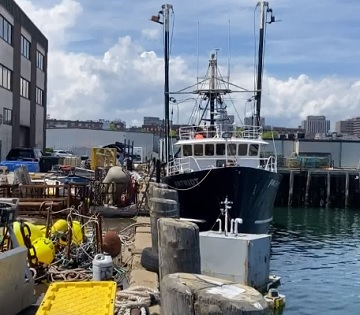
Rising fuel prices hit Maine’s commercial fishermen
The high prices of fuel are also hitting boat works and marinas. When looking at the fuel costs for commercial fishers, the problem does seem to increase among that industry. “We burn 600 gallons a day. You figure six times 10. You do the math. It’s a $60,000 fuel bill,” Michael Irving, captain of F/V Patriot, in Portland, said. Irving spent the afternoon untying knots in his dragnet targeting groundfish. He said he didn’t make any money last week because of the diesel fuel increase. “We’re going to try and feed America, but we can’t not go out and catch fish. It is a living, you know. We’re just going, and we don’t get paid for it. The boats have to go either way,” Irving said. “I don’t know. It’s ludicrous. It’s stupid,” Irving said. Video, >click to read< 08:04
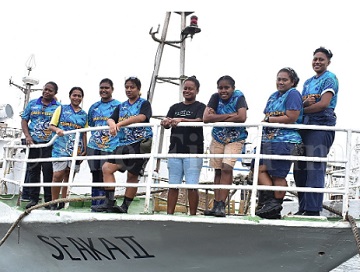
A world first – First all-female deck crew for Fiji
A world first, history was created yesterday when eight ladies set out to sea as the first full female deck crew on board tuna long-line vessel SEAKA II for a two-week fishing expedition. The initiative was made possible via a partnership between Fijian-owned company SeaQuest Fiji and the Pacific Islands Forum Fisheries Agency (FFA). FFA said the all-female deck crew was one step towards addressing gender imbalance in the Pacific tuna industry. “To see an all-female crew loading ice bait and stores, to see a female first officer, a female engineer and a female bosun, to see real progress in our shared goal of increasing female employment in the tuna harvesting sector. >click to read< 18:36
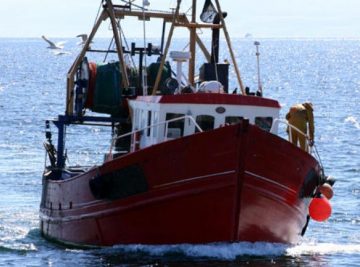
UK fishing industry reports Brexit woes
As well as the issue of quotas for wild-catch fisheries, the report finds, the UK’s seafood industry has been struggling with increased paperwork for exports to the European Union and labour shortages following new restrictions on recruiting staff from the EU. In winter 2021, the APPG on Fisheries released a survey to collate experiences of Brexit as reported by members of the fishing industry. Responses revealed significant and shared concerns around financial losses and the long-term viability of individual businesses, fishing fleets, and other parts of the industry including processors and transporters. >click to continue< 15:30
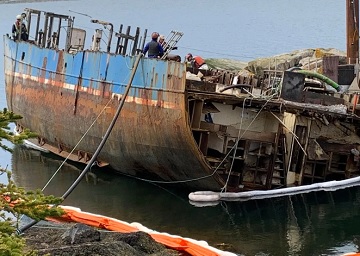
Crews in Colliers carefully dismantle shipwrecked fishing vessel
A ship that sank in Newfoundland’s Conception Bay 16 years ago is now being demolished and will be recycled, according to the Canadian Coast Guard. The Hamilton Banker has a lengthy history. The fishing vessel sank in June 2006 in Harbour Grace, before being refloated and towed to nearby Colliers. Andrew Wakeham, a senior response officer with the coast guard’s environmental response program, says the ship eventually drifted ashore and ran aground during the January 2020 blizzard known as Snowmageddon, and has remained there ever since. photos, Video, >click to read< 12:06
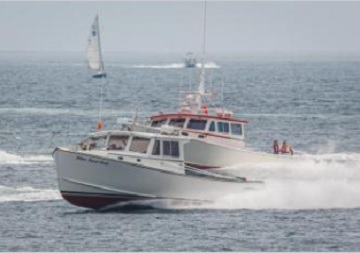
Get your motor started: It’s lobster boat racing season!
That’s right, racing fans, it’s time to rev up your motors! Maine’s 2022 lobster boat racing season kicks off right here in Boothbay Harbor with the Charles Begin Memorial Lobster Boat Races on Saturday, June 18. If you’re a boat captain, signup is at Brown’s Wharf at 121 Atlantic Ave. between 8 and 10 a.m. First race is at 10. Ashleeann Lowery has been a member of the Boothbay Harbor Race Committee since 2007, and president for 10 or so of those years. She’s looking forward to the races and is curious about how many boats will show up. >click to read< 10:58
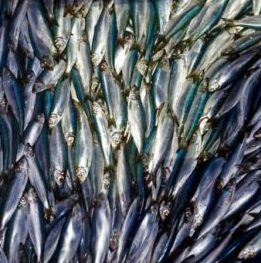
Herring and Mackerel fishing ban: Pelagic fishers from southern Gaspésie appeal for help to Ottawa
This decision had been taken, two days before the opening of the commercial herring fishery, by DFO in order to regenerate the stocks of the two species which would be in critical area
. Since then, pelagic fishermen have received no response from Ottawa, which is slow to decide on possible financial compensation. According to the president of the Association of Professional Pelagic Fishermen of Southern Gaspésie, Ghislain Collin, a dozen fishermen are currently in a very critical position. Captain Tom Langelier is one of those fishermen who lives only from herring and mackerel fishing. >click to read< 09:04
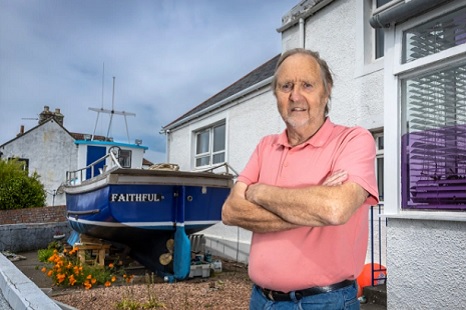
Heartbroken fisherman banned from pier after 63 years at the harbour
A Fisherman has been forced to put his beloved boat on the market after harbour chiefs told him he was barred. Heartbroken John Hutchinson, 73, has been banned from the pier at Lower Largo, Fife – where he has been fishing since the age of 10. John is the third generation of his family to fish from the harbour following in the footsteps of his father, and grandfather. But this week his application to moor the 6.5m vessel was knocked back. “I want an apology and an explanation. Nobody is answering me and it’s not right. “I have worked hard all my life and giving up fishing like this would break my heart.” photos, >click to read< 21:36
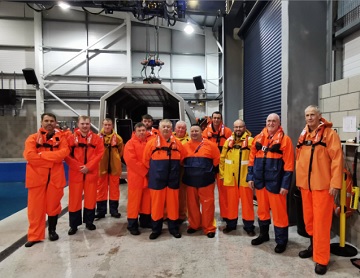
Fishermen say survival training could prove vital
Five fishermen have undertaken man overboard training to help reduce incidents at sea. The free in-water courses held in Aberdeen, demonstrate how to avoid overboard incidents, and what can be done to recover and improve the chances of survival. The environment pool training facility at energy sector training provider Survivex, which simulates some of the conditions experienced at sea, including heavy swells and rain. The session was funded by the Fishing Industry Safety Group, a partnership between the Maritime and Coastguard Agency, RNLI, fishermen’s associations from across the UK and public body Seafish. >click to read< 18:30

Scientists see long-term hope for Maine’s lobster fishery despite warming waters
Dire predictions about the effects of global warming on Maine’s lobster population may be exaggerated and underestimate the potential that conservation measures have to preserve the fishery into the future. The UMaine scientists are now projecting that temperatures in Gulf of Maine will likely remain within lobsters’ comfort zone because of the gulf’s unique oceanographic features, though changing ocean currents are harder to predict. The researchers cautioned that the dynamics of global warming are complex and make it difficult to project far into the future with certainty. >click to read< 16:21

Most folks along the Oregon Coast don’t want huge wind farms that threaten fishing areas
On June 15th the federal government, aka Bureau of Ocean Energy Management, will be in Newport to hear public comment on plans to install huge wind farms right off the Oregon Coast. Although BOEM, a federal agency, is angling for major quantities of wind-generated electricity for those living and working along the coast, especially in the fishing industry, don’t want any twirling wind turbines because, they say, energy can be developed on land far cheaper and more reliably. Commercial fishermen are absolutely opposed to placing windmills offshore because they will take fishing areas that are now devoted to commercial fishing. Public meeting details, >click to read< 10:14
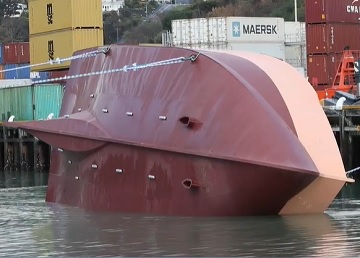
Hull tipped over for fishing boat build
An important stage in the construction of a new $6 million fishing vessel in Nelson has been reached, with the boat’s hull lowered and turned over in the water. The longline vessel Te Runanga is being built for Westfleet by Nelson-based Aimex Service Group and on Friday the hull was lowered into Nelson Harbour so the next stage of the build can begin. The hull had been built upside down at Aimex’s workshop, and because of its weight, rolling it over on the water was the easiest way to turn it up the right way for the vessel build to be finished while it was in the water, Video, photos, >click to read< 08:47
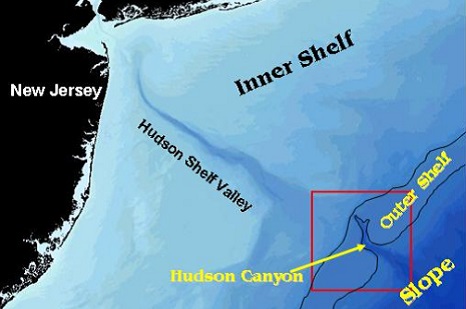
US citizens will suffer from a Hudson Canyon Marine Sanctuary
On June 8 th, the Biden Administration announced its newest attack on American small businessmen by declaring the Hudson Canyon region as a protected marine sanctuary. The Hudson canyon is the largest and deepest canyon on the US east coast, about the size of the Grand Canyon. It was created by the outflow of the Hudson River over the course of millions of years and because it is one of the most biologically diverse ecosystems on the east coast, it is also one of the best fishing grounds. In a non-sensible announcement of Biden’s plan, NOAA Administrator Richard Spinrad, joyously proclaimed that “A sanctuary near one of the most densely populated areas of the Northeast U.S. would connect diverse communities across the region to the ocean and the canyon in new and different ways”. How many different fisheries are going to be affected by a Hudson Canyon Closure? Every one of them. By Jim Lovgren >click to read the article< 17:39
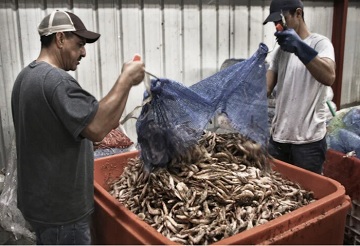
Delcambre shrimp processor overcoming old and new problems to survive
Gulf Crown Seafood’s Jeff Floyd and his son Jon agree that every year in the seafood business is unique. Each year new problems arise and are added to the same old ones continuously sticking around. Last year new problems arising from Covid and Hurricane Ida were added to the old ones; H2B visiting worker visa, labor shortages, import prices and product availability. “We weren’t affected directly by Hurricane Ida,” said the senior of the Floyds. “But without production this plant doesn’t survive. They only way we get production is with the boats. I don’t know exactly how many we lost out of the fleet from the storm, but talking to those at the docks their were a lot a fisherman whose boats won’t be able to be salvaged.” Gulf Crown Seafood in Delcambre is one of approximately seven shrimp processors left Louisiana. >click to read< 12:58
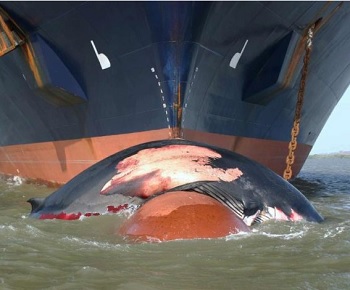
New restrictions on ships to protect whales coming
The National Oceanic and Atmospheric Administration has been reviewing the speed regulations it uses to protect North Atlantic right whales, and according to spokesperson Allison Ferreira, the agency will publish new proposed rules within the coming weeks. A public comment process would follow. More than 50 of the whales were struck by ships between spring 1999 and spring 2018, NOAA records indicate. >click to read< 09:36
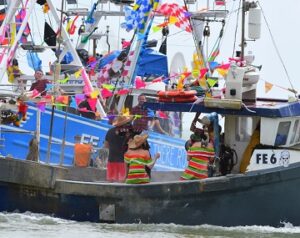
Colourful look back at Folkestone Trawler Race as organisers announce new date
Folkestone’s Historic Trawler Race is set to take place at the end of July with what promises to be a fun and entertaining weekend. The race is held in support of the local fishermen and to celebrate the magnitude of the towns rich fishing history. The ‘Trawler’ race is set to take place on Saturday, July 30, with a home-made raft race taking place on Sunday, July 31. The event is completely free and hopes to encourage more people to visit the quay and support their local fisherman by buying fresh fish locally. >click to read< Gallery: A look back at the historic Folkestone Trawler Race >click here< 08:12
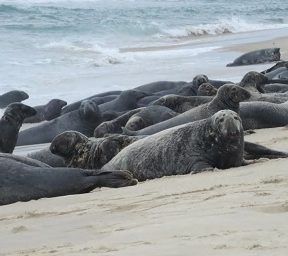
DFO: Atlantic Canada Grey Seal population is slowing
The grey seal population in Atlantic Canada continues to grow and is now estimated at 366,000, according to the 2021 stock assessment released Thursday by the Department of Fisheries and Oceans. But DFO says the population is growing at a much slower rate than in previous years and for the first time in 60 years it is believed pup production has decreased on Sable Island. Scientists used a new model to estimate the population in the latest report. It converted pup production numbers from aerial surveys to total population by combining reproductive and survival rates with the small number harvested by humans. Applying the new modelling to its 2016 estimate produced a sharply lower result. >click to read< 13:44






